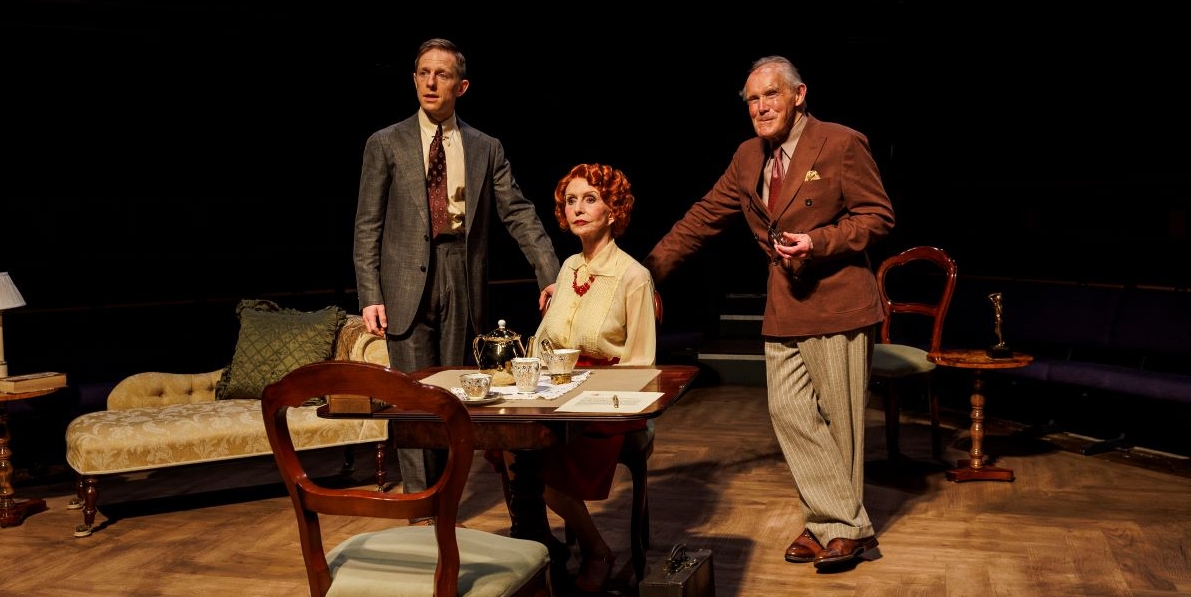Tom Littler’s first outing as the new Artistic Director of the Orange Tree Theatre is very much in the traditions of this house – take an underperformed play of yesteryear and through a new production reveal a hard edge of continuing relevance for our own times. It succeeds very well on these terms.
‘The Circle’ was first shown in 1921 and appears at first sight to be a conventional well-upholstered drawing-room comedy, with french windows, fine furniture, the sound of birdsong and the gentle tick of a grandfather clock, topped off with a balcony swag of wisteria, all suggesting a comfortable country house ambience. But the reality is much tougher-minded than that. The relationships depicted and morals drawn belong more naturally in the world of the short stories and novels we more naturally associate with this author – a world that some would call cynical and which is perhaps more accurately viewed as unflinching.
The plot revolves around two couples and whether history repeats itself. The house is owned by a youngish member of parliament, Arnold, and his wife Elizabeth. Arnold seems rather more interested in his work and in Georgian furniture than his wife, who is much more charmed by Teddie, a visiting Indian businessman who is a planter in Malaya. Arnold’s father, Clive, still lives on the estate too; and we learn that both their lives are still deeply affected by the departure, when Arnold was very young, of his mother, Lady Kitty, who eloped with Clive’s best friend, Lord Hughie Porteous. The play begins as, by a mishap of planning, they are all reunited for lunch.
This sets up ample comic possibilities which Maugham explores with many witty Wildean one-liners. But as the evening progresses we see that this play also anticipates the mores of Coward’s ‘Private Lives’ in the probing questions posed about modern divorce laws and the consequences for all concerned of a decision to kick over the traces and reject the conventions of society. It becomes clear that Teddie and Elizabeth may be about to repeat the actions of Kitty and Hughie, and much of the action consists of attempts to head them off which in turn unravels the complicated motives and compromised positions of the other characters. The denouement still retains a genuine element of surprise as individual character becomes the determining factor in the outcome.
There is a sharp contrast between the acting styles of the younger and older performers. The former engage with the play with febrile, rapid-fire intensity, which is sometimes a little relentless and indicative of a certain lack of confidence in the medium and some of the inevitably dated language. Whereas the former all slow down the pace and relish the opportunities to develop detailed characterisations across the arcs of each of the three acts.
Pete Ashmore has the most thankless role in the somewhat stodgy, emotionally stunted role of Arnold; but he does demonstrate the growth of his character’s awareness as the play progresses and wins our sympathy by the end. Olivia Vinall also manages to escape from the stereotype of the bored, easily-won housewife to register a powerful case for the free will of women to escape the social roles imposed upon them by men. Again the beckoning shade of Coward’s Amanda is not far away. Chirag Benedict Lobo completes the younger team with an energetic, idealistic portrayal of a businessman both idealistic about love and ruthless in pursuit of his goals.
All the older players bring a ravishing sense of detail to their building up of character. Jane Asher gives a gracious and multi-layered portrayal of Lady Kitty, indicating both her raddled, superficial, frivolity and also an underlying unease at having wasted her life – without ever quite understanding how things might have been otherwise. Her long speech warning Elizabeth not to follow her example is exquisitely poised, paced and delicately delivered. Orbiting around her, Nicholas Le Prevost provides a miracle of grumpy, irascible understatement, anchored around a badly fitting set of dentures. When he finally lets rip over the extent of his disappointments and regrets it is all the more powerful. But perhaps the performance of the evening belongs to Clive Francis as the quietly embittered, cuckolded husband. With delicious comic timing he calculatedly serves up his dish of revenge cold. The cast is completed by Robert Maskell’s immaculate butler, another of those supercilious, passive-aggressive servants who link the play to the world of Wilde and Coward.
As usual at this theatre, sets,costumes, lighting and sound reinforce the action to a high standard, with an evocation of period atmosphere without the dead hand of literal naturalism. All in all this is a diverting and stimulating evening that marks an impressive debut.

